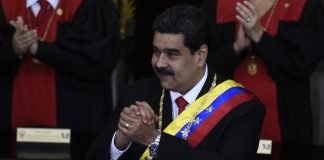By George Friedman
The European Council, a summit of leaders, met this week to discuss the various issues that faced the European Union. It is important to distinguish between meeting to decide and meeting to discuss. This can be seen with two crucial issues. The first was the question of how to protect Europe’s borders from uncontrolled entry by large numbers of immigrants. It was decided that they were to plan to field an effective European border force sometime by June. That is six months from now. The second was about the future of Britain’s relationship with the European Union. There is a large segment of British voters who want to leave the European Union. Britain’s Prime Minister David Cameron wants to remain in the EU but wants to renegotiate the terms of British membership in order to defang British opponents of the EU. This is not so much a matter of renegotiating Britain’s role but really of redefining how the EU works. Rather than have Europe’s leaders discuss and decide on what is to be done, the matter was turned over to the EU bureaucracy for recommendation. This delayed any decision for at least some months, and it also attempted to depoliticize what is a political matter.
These two issues are now the core problems of the EU — adding only to the ongoing financial problem. They are both political problems. The problem of immigration is a question of who controls borders. It is a question of sovereignty. The question of British membership is also a political problem. Does membership benefit Britain and under what circumstances does it do so, and will the rest of the EU accommodate the British requirement? Instead of settling these things at a summit, or letting the European Parliament make the decision, it was sent off for consideration by the EU’s bureaucracy.
As a result, the question of borders – which is a question that must be settled now – has been put off for study. The British question – which must be settled at the highest political levels – has similarly been sent off for study and proposals. These are questions that have been on the table for months now. Europe’s political masters already knew both the issues themselves and the options they have for dealing with them. By sending the issue to be studied by European Union bureaucracy, they are simply putting off facing extremely significant decisions. Turning these issues over for study by a committee makes it appear as if these issues surprised the leaders, and that they really need someone else to think about them. Essentially, bureaucratic options are simply a menu, frequently limited, from which politicians must choose and negotiate. These two decisions simply put off facing extremely significant questions by turning them over for study, as if the issues surprised the leaders, and they need to really have someone else think about them.
In trying to understand the root problem of the European Union, consider their inability to rapidly devise and implement a solution for the borders and immigration issue, which is not an impending crisis but one that had to be decided months ago. The EU has been unable to reach a consensus because it is a political problem. The politicians have to face their own electorates and generally are not free actors. The question of national sovereignty relative to the EU has never been clearly and finally settled, and as the economy and political climate deteriorate, the public in many countries are wary of surrendering sovereignty, particularly to the EU bureaucracy that is not transparent and not clearly accountable to anyone. So at the summit, the serious questions were pushed off to the very institution that is least trusted.
The Bertelsmann Institute recently released a study of British voter attitudes on the EU, given the referendum that has been promised. The majority, but not an overwhelming one, still wish to remain with the EU. Supporters of staying in the EU place peace and security above all other issues and are prepared to have either national governments or the EU take care of it. Those who opposed the EU place this at the top, but want to move power away from the European Parliament and other EU institutions to national governments. On the other hand, people in other major European countries share concerns but want them handled by the EU.
This might appear to be a matter where people can find common ground. Most British subjects want to stay in the EU and don’t care who handles security issues. The rest of the European Union wants the EU institutions to handle it. Surely there isn’t a great gap on this. But underlying this is the great problem. The question of border security needs to be handled now. The decision of the EU leadership is to have it in place by June. Crises of national security and the decision-making process of the EU are completely incompatible. The decisions have to be made at the political level and there is no consensus on the solution. The problem is moved into the bureaucracy which is institutionally slow, and used to frequently avoid, not make decisions.
Therefore, the fact that the majority of the British public support the EU, hold security as the leading issue, and don’t care who settles it, takes an interesting turn when we consider that the EU is institutionally incapable of making decisions on time critical matters. The anti-EU vote in Britain wants to take decision-making power away from European institutions and make them matters of national negotiations. But both factions have to arrive at the same conclusion. The pro-EU faction has to face the fact that without ceding more power to an unelected commission, the EU can’t make decisions and that would take many years of negotiations and probably referendums. The anti-EU faction has to face the fact that 28 national leaders cannot make decisions on national security, where days, hours and perhaps minutes count. The nation-states of Europe were historically constructed to make these decisions. Their leaders are elected by a public expecting them to do so, and while they might not object to effective decision-making by the EU, the fact is that no such structure exists. Where it might exist it is not accountable, and what is accountable doesn’t have such a structure.
The issue of Britain remaining in the EU and the issue of border protection therefore are, in reality, different parts of the same issue. If security is the leading issue in Europe, waiting for six months to deploy a force to defend borders doesn’t work. The only entity that can make rapid decisions and be accountable is the nation-state. Whether or not the treaty changes, the nation-states are making the decisions by default. In the real world they are the only ones who can make time-sensitive decisions in an accountable way. The pro-EU British voter is prepared for an EU that doesn’t exist. The pro-EU faction in Europe supports EU decision-making that can’t be made.
The U.S. had a similar problem when it was founded around Articles of Confederation. No one knew who was responsible for the national debt, for example. A new constitution was crafted that saw these problems and tried to solve them. There is no movement in Europe for a central government that is elected, accountable, and has a commander in chief in charge. Some speak of it, but there is no massive movement for such reconstitution, and in many ways, there is no time. Europe is in crisis, and decisions need to be made now, and the only thing everyone at the summit could agree on is that there should be more study of the problems. That was the reality at the EU summit that was visible to all who wanted to acknowledge it.






 Special Collection – The Middle East
Special Collection – The Middle East